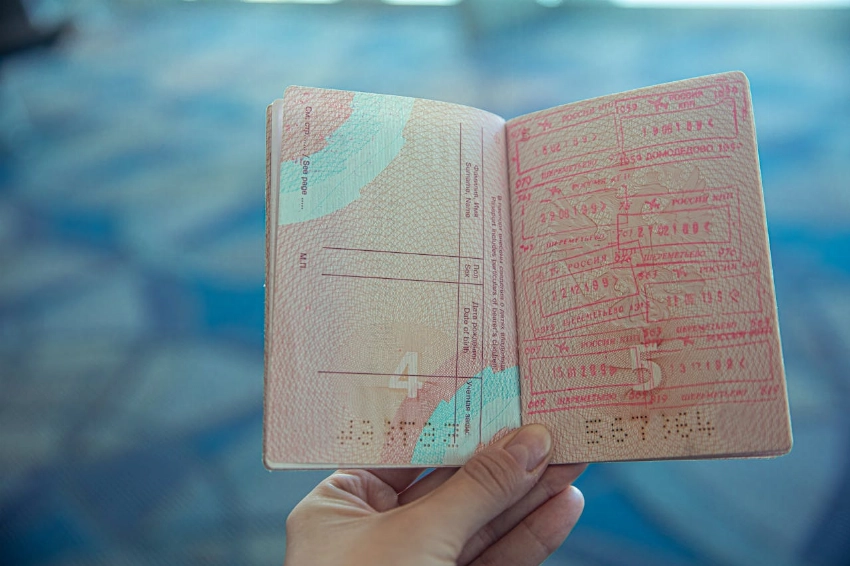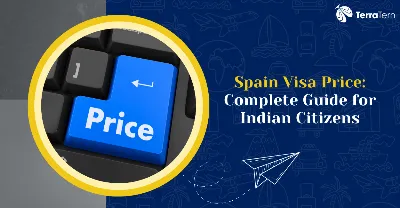Key Highlights
- How to Get Spain Work Visa from India: Step-by-Step Process
- Spain Work Permit Visa from India: Types and Categories
- EU Blue Card for Highly Skilled Professionals in 2025
- Spain Work Visa Processing Time from India: What to Expect in 2025?
- Estimated Processing Times for Spain Work Visas from India
- Cost for Applying Work Visa for Spain from India: Complete Fee Structure
- Degree Required for Work Visa in Spain from India: Qualification Guidelines in 2025
- Education Qualification for Spain Work Visa from India: Recognition Process in 2025
- Spain Work Visa Requirements: Complete Checklist for Indians in 2025
- Spain Work Visa Application Process: From India to Employment in 2025
- Top Spanish Cities for Indian Professionals: Job Market Analysis in 2025
- Common Spain Work Visa Rejection Reasons and How to Avoid Them in 2025?
- Latest Facts and News for Spain Work Visa
- Conclusion
How to get Spain work visa from India? Indian professionals are now eyeing Spanish career opportunities, in ever-increasing numbers, to take advantage of the Spanish bullish economy and the booming Spanish job market, and the vibrant Spanish culture. Having already gained an enviable location and quality of life as well as a rising number of skilled professionals especially in the fields of technology, healthcare, and engineering workforce, the country is quite a promising venture. The guide is intended to shine light on the whole process of acquiring Spain work visa from India in 2025 since this subject is not considered well-known and detailed information is absent; therefore, this blog will allow Indian specialists to make the next step of moving towards applying successfully and getting nore knowledge on degree required for work visa in Spain from India!
How to Get Spain Work Visa from India: Step-by-Step Process
The Big question is How to get work visa for Spain from India? The task of getting a Spain work visa from India consists of a complex machine of actions that are carefully performed. It is an entire section: a breakdown of the total process of getting the job and getting to Spain, including the contributions of the employer and the employee and necessary time considerations. Let’s know more about How to get work visa for Spain from India!
1. The Role Of the Employer in the Spanish Work Permit Application
The Spanish employer is the key in triggering the Spain work visa from India process. Their roles are essential towards the successful application.
- Work Authorisation: An employer needs to get a work authorisation (Autorización de Residencia y Trabajo) for the work to enter an Indian professional in either the Provincial Foreigners Office (Oficina de Extranjería) or the Large Companies and Strategic Collectives Unit UGE-CE) in Spain, based on the type of visa. This is normally done by showing that the job could not be given to a local or EU citizen (without exception).
- Filing Job Offer Information: The employer files the job offer information, such as the salary details, job description as well and contract term to the Spanish authorities.
- Necessary Documents: The employer provides the foreign national with the approved work authorisation together with other supporting documents, which is a requirement in the Spain work visa from India application to the Spanish Consulate in India.
2. Employee Documentation and Preparation
Indian professionals are required to obtain the complete set of documents, and once the employer obtains the work authorisation, it can proceed to prepare all the necessary documents for the Indian professional.
- Passport: It must be a valid passport that should have at least six months to stay after the date of arrival and at least two blank pages.
- Visa Application Form: This is a duly filled and signed national Spain work visa from India application form.
- Photographs: It should be in coloured passport-sized photographs.
- Work Authorisation: A copy of an original work authorisation released to the employer in Spain (where the same applies).
- Employment Contract: An employment contract stamped by the Foreign Nationals Office in Spain.
- Educational Qualifications: Proper educational certificates and transcripts that have been apostilled (see below).
- Documentation of Professional Experience: Copies of experience letters and resumes.
- Criminal Record Check: Applicants have to present a criminal record check certificate issued by relevant authorities in India (e.g., Police Clearance Certificate) and apostilled and translated into Spanish. This should not be an outdated certificate that is more than six months old.
- Medical Certificate: A medical report done by an established medical practitioner to the effect that the applicant is not affected by any diseases, which may be a risk to society. This certificate shall not be more than three months old.
- Evidence of Financial Resources: The financial aspect of the Spain work visa from India is that the employee needs to show financial resources before the first salary payment. This is a critical requirement in the case of self-employed or digital nomad visas.
- Travel Insurance: Documentation of 30,000 comprehensive travel medical insurance to cover the whole duration of stay in the Schengen area.
- Visa Fees: The payment of the relevant Spain work visa from India fees.
- Documentation of Legal Residence in Consular District: This is a document showing the legal residence in the consular district in which the application is properly made.
3. Consulate Application Process
Once all the documents are ready, the Indian professional proceeds to the Spanish Embassy or Consulate General in India to complete the application.
- Appointment Booking: Book a general appointment at your closest Spanish Embassy or Consulate General (Delhi, Mumbai, Bengaluru, Kolkata or Chennai, depending on consular jurisdiction) or through their authorised service provider, BLS International. It is better to have a reservation ahead of time because it is sold out.
- Document submission: Go to the appointment on time and go with all the required documents. Get all documents in order according to the checklist given by the consulate or VAC.
- Interview (optional): The consular agent can carry out a small interview to understand more about the application, job offer and plans in Spain.
- Biometrics: Submit biometrics (fingers and digital photograph) at the Spain work visa from India application centre.
- Visa Processing: The consulate is the place where the Spain work visa from India is processed. Processing takes time, which is dependent on the type of Spain work visa from India and the amount of the application.
- Visa Collection: After approval, it will be possible to collect the Spain work visa from India at the consulate or deliver it back by courier. After obtaining the visa, look at the details and make sure everything is right.
- Entry to Spain and TIE: When the holder of the Spain work visa from India arrives in Spain, within one month of entry to the country, he or she must make an application in respect of the Foreigner Identity Card (Tarjeta de Identidad de Extranjero or TIE).
Also Read: Top 10 Europe Visa Consultants: Latest Experts List
Spain Work Permit Visa from India: Types and Categories

Spain has different types of work visas depending on the professional profile of people and employment conditions. This is because an Indian professional needs to understand these categories to determine the best one based on his or her expectations.
General Employee Visa (Common)
The most utilised category of Indian professionals is the General Employee Visa, also referred to as the Spain work visa from India of Salaried Work (Visado de Trabajo y Residencia por Cuenta Ajena).
- Purpose: It is issued to the persons who have been offered a job by a Spanish company and are going to work under an employment agreement.
- Employer Sponsorship: Compelled the source of scripture, the Spanish employer, to make application to and get a work permit in the name of the employee at the Provincial Foreigners Office.
- Labour Market Test: Tends to be subject to a national labour market test, i.e. that the employer must demonstrate that the post could not be filled by a local or EU national. Nevertheless, there are exemptions regarding such shortage occupations (e.g., in engineering and IT) in the year 2025 for this test.
- Initial Validity: These documents are usually issued during the life span of the contract of employment, at most one year and can be renewed.
EU Blue Card for Highly Skilled Professionals in 2025
The EU Blue Card will allow highly qualified, non-European professionals to work in the European Union.
- Eligibility: It needs a degree in higher education (a university degree equivalent to EQF level 6 or greater) or at least five years of relevant work. In the case of ICT professionals, it will only require three years of relevant experience within the last seven years. It also needs a paid work offer within a certain determined level of pay (in the case of Spain, it would need to be of 40,077 a year by technical, scientific and intellectual types of workers, and 54,142 a year, in the case of directors and managers, in 2025). These values can be decreased by 0.75 in the case of applicants below 30.
- Strengths: It provides quicker procedures (approval is frequently in 20 working days), it allows the reunification of the family, and more freedom to move in other EU members in the case of 12 months of legal residency in Spain.
- No Labour Market Test: Contrary to the general work visa, the EU Blue Card does not require a labour market test.
The Seasonal Work Visa
The Season Spain work visa from India (Visado de Trabajo de Temporada) is to be applied for by persons who practice seasonal work, mostly in the fields of agriculture or tourism.
- Time: Not valid after nine months in any 12 months.
- Employer's Responsibility: Accommodation and travelling expenses are supposed to be taken care of by the employer.
- Return Obligation: The applicants should be ready to go back to their motherland once the contract is over.
Self-Employed Work Visa
Self-Employed Work Visa (Visado de Trabajo y Residencia por Cuenta Propia or Visado de Autonomo) The Self-Employed Spain work visa from India is aimed at Indian professionals, and it is issued to them when they want to set up their own business or practice as a freelancer in Spain.
- Requirements: It needs an elaborate business plan, evidence of adequate financial resources to live and run the business (approximately 7000 per annum), and a professional qualification or experience.
- Approvals: Needs a positive report of the feasibility of the project by the corresponding professional association or bodies in Spain, depending on the kind of self-employment.
- Processing: More extensive and possibly time-consuming since it will comprise the thorough evaluation of the business plan.
Digital Nomad Visa
The Digital Nomad Spain work visa from India was launched in 2023 and allows working remotely with non-Spanish companies to professionals who can perform the job remotely.
- Eligibility: Must have a demonstration of an adequate income that does not depend on Spain (not less than 200 per cent of the lowest interprofessional wage, which will be equal to around 2,763 per month in 2025). Dependents also need additional amounts (25 per cent and 75 per cent of SMI on additional or first, respectively). The candidates must have a postgraduate or undergraduate degree, or three professional experience.
- Advantages: Has an attractive tax treatment within the initial years and has the potential to reside and work in Spain, but for clients overseas.
- No Spanish Employer: No Spanish Employer or conventional labour settlement in Spain required, persons need to work in firms that are found outside Spain. Up to 20 per cent of revenues can be of Spanish origin.
Overview of Spain Work Visa Types for Indians
Here is an overview of Spain work visas from India:
|
Visa Type |
Description |
Key Requirements |
Processing Time (Approx.) |
|
General Employee Visa |
For individuals with a job offer from a Spanish employer. |
Employer-sponsored work permit, employment contract, and compliance with labour laws may require a labour market test. |
2-5 months |
|
EU Blue Card |
For highly skilled professionals with a high-paying job offer. |
University degree (EQF 6+) or 5+ years relevant experience (3+ for ICT in last 7 years), minimum salary (40,077/54,142 annually), job offer. |
1-2 months |
|
Seasonal Work Visa |
For temporary work in specific sectors like agriculture or tourism. |
Employer-provided accommodation and travel, commitment to return, maximum 9-month stay, sector-specific skills. |
Varies (employer-driven) |
|
Self-Employed Work Visa |
For entrepreneurs or freelancers who are establishing their own business in Spain. |
Detailed business plan, sufficient financial means (approx. 7,000/year), relevant qualifications/experience, favourable viability report. |
3-6 months |
|
Digital Nomad Visa |
For remote workers earning income from outside Spain. |
Proof of remote work, stable income (approx. 2,763/month for single applicant), degree or 3+ years of experience, and health insurance. |
1-2 months |
Spain Work Visa Processing Time from India: What to Expect in 2025?

It is important to know how long a Spain work visa from India will take when applied in India. Although there are estimates of the length issued as official guidelines, there are a number of factors which may impact the actual length.
Normal Processing Timeframes per Visa Type
The processing time will be very variable depending on the Spain work visa from Indiatype and the efficiency of the consulate.
- General Employee Visa: The processing time in Spain can be around 1-3 months, and the visa process at the consulate in India can be up to 15-60 days.
- EU Blue Card: The permit to Highly Qualified Professionals (HQP) is granted within 20 working days in Spain by the UGE-CE. The visa is then processed at the consulate, where the response can be very quick (10-15 working days).
- Seasonal Work Visa: Seasonal visa processing times are likely to vary depending on numbers and the actual seasonal demand, but is similarly likely to take the same amount of time as any other employee visa once the work permit has been obtained.
- Self-Employed Work Visa: This visa can take 3 to 6 months because of the thorough evaluation of the business purpose.
- Digital Nomad Visa: It will usually take 1 to 2 months.
Estimated Processing Times for Spain Work Visas from India
Here is a breakdown of the processing time for Spain work visa from India:
|
Visa Type |
Work Authorisation in Spain (Approx.) |
Visa Application in India (Approx.) |
Total Estimated Time (Approx.) |
|
General Employee Visa |
1-3 months |
15-60 days |
2-5 months |
|
EU Blue Card |
20 working days |
10-15 working days |
1-2 months |
|
Seasonal Work Visa |
Varies |
Varies |
Varies |
|
Self-Employed Work Visa |
N/A (integrated) |
3-6 months |
3-6 months |
|
Digital Nomad Visa |
N/A (integrated) |
1-2 months |
1-2 months |
Latest Factors That May Delay Your Spain Work Visa Application in 2025
There are a number of reasons why your work visa application may be delayed. Knowledge of them can enable you to minimise possible problems.
- Unfinished Documentation: The reasons for the delay are most often. The process may take a lot of time when documents are not organised or submitted correctly, or when there are problems with the apostille or translation.
- Large Number of Applications: Some applications face a backlog at consulates, and therefore, during a high-demand moment or season, the processing time can take longer.
- Further Information Requests: In case the consular officer needs more clarification or further information, it will automatically take longer.
- Complex Cases: Applications with special situations, background checks, or specialised professional qualifications would need more time in review.
- Public Holidays: The processing times can be affected by the Spanish and Indian public holidays.
- Incorrect Submission: Applying in a consular jurisdiction that is not part of a job where the applicant is to work; failure to adhere to a particular subset of submission requirements.
Experts Tips to Expedite Processing for Spain Work Visa
While some factors are beyond your control, you can take steps to ensure a smoother and potentially faster application process.
- Early Application: Apply well in advance of your intended travel date, ideally 3-6 months.
- Meticulous Documentation: Double-check all documents against the official checklist. Ensure everything is correctly translated, notarised, and apostilled.
- Organised Submission: Present your documents in a clear, organised manner, as requested by the consulate.
- Accurate Information: Provide accurate and consistent information across all forms and documents. Discrepancies can lead to scrutiny and delays.
- Prompt Responses: If the consulate requests additional information, respond as quickly and comprehensively as possible.
- Professional Assistance: Consider engaging an immigration consultant or legal expert specialising in Spanish visas, as they can help ensure all requirements are met and navigate complexities.
Cost for Applying Work Visa for Spain from India: Complete Fee Structure
Understanding the financial outlay for a Spain work visa from India is essential for budgeting. The costs involve official Spain work visa from Indiaa fees, potential service charges, and expenses related to document preparation and translation. Let’s know more about the cost of applying for a work visa for Spain from India!
Official Visa Fees by Category
The official visa fees are set by the Spanish government and are subject to change. As of January 1, 2025, the general National Visa fee is 8,021 Indian Rupees. However, additional fees apply for specific work permit categories.
Spain Work Visa Official Fees (as of January 1, 2025)
Here is cost for applying work visa for Spain from India:
|
Visa Category |
Fee (Indian Rupees) |
Additional Fee Required For |
Additional Fee (Indian Rupees) |
|
National Visa (Standard) |
8,021 |
N/A |
N/A |
|
Residence Visa With Work Permit Exemption |
8,021 |
Temporary residence with the exception of a work permit |
975 |
|
Work And Residence Permit For Self-Employed |
8,021 |
Self-employed work authorisation |
18,167 |
|
Residence authorization |
975 |
||
|
EU Blue Card (Highly Qualified Professionals) |
8,021 |
Authorisation of initial residence for highly qualified workers |
73.26 (Euros, paid in Spain, conversion applies) |
|
(Visa fee is part of the National Visa Fee) |
N/A |
||
|
Digital Nomad Visa |
8,021 |
(Specific fees may apply for a residence card later) |
Varies |
Note: These fees are approximate and can fluctuate due to exchange rates and policy changes. It is advisable to check the latest fees on the official website of the Spanish Embassy/Consulate in India.
Additional Service Charges and Hidden Costs
Beyond the official visa fees, applicants should account for other potential expenses.
-
Visa Application Centre (VAC) Fees: If applying through a third-party visa application centre (like BLS International), a service charge will be levied. This is typically a few thousand Indian Rupees.
-
Courier Fees: For document return via courier, if offered by the VAC.
-
Biometric Fees: Usually included in the VAC service charge or visa fee, but it's worth confirming.
-
Travel and Accommodation for Appointment: Costs associated with travelling to the consular jurisdiction for your visa appointment.
-
Health Insurance Premium: Mandatory travel medical insurance will incur a premium, which can vary based on coverage, duration, and provider.
Document Preparation and Translation Expenses for Spain Work Visa From India
Proper document preparation is critical and comes with its own set of costs.
-
Apostille/Legalisation Fees: Fees for getting educational, birth, marriage, and criminal record certificates apostilled by the Ministry of External Affairs (MEA) in India. This typically involves a few hundred Indian Rupees per document, plus potential charges from outsourcing agencies.
-
Translation Fees: All non-Spanish documents (except the passport) must be translated into Spanish by a sworn translator (traductor jurado) recognized by the Spanish Ministry of Foreign Affairs. These fees can range from a few hundred to a couple of thousand Indian Rupees per page, depending on the complexity and volume of the text.
-
Notarization Fees: Some documents might require notarization before apostille or translation.
-
Photocopying and Printing: Basic costs for making multiple copies of all documents.
Also Read: Top Europe Job Consultancy in India: Experts List
Degree Required for Work Visa in Spain from India: Qualification Guidelines in 2025

The educational and professional qualification requirements for a Spain work visa from India vary significantly depending on the type of visa applied for. Spain aims to attract skilled professionals, and formal qualifications often play a crucial role.
Minimum Educational Requirements by Visa Type
Here is the breakdown for minimum education and degree required for work visa in Spain from India:
-
General Employee Visa: While there isn't a universally mandated minimum degree required for work visa in Spain from India, specific jobs will require relevant qualifications. Generally, a bachelor's degree or a diploma in the field of employment is expected. For certain regulated professions, specific professional licenses or accreditations will be necessary.
-
EU Blue Card for Highly Skilled Professionals: This is the most stringent in terms of educational requirements. Applicants must generally hold a higher education qualification (university degree) equivalent to a Spanish university degree (EQF Level 6 or above), or possess at least five years of relevant professional experience equivalent to a higher education qualification in their field. For IT managers or IT professionals, a minimum of three years of relevant professional experience during the past seven years is required.
-
Seasonal Work Visa: Educational requirements are typically less stringent and are more focused on practical skills relevant to the seasonal work (e.g., agricultural skills, hospitality experience).
-
Self-Employed Work Visa: Requires demonstrating sufficient professional qualifications or experience relevant to the proposed business activity. This could be a degree, relevant certifications, or a proven track record in the field.
-
Digital Nomad Visa: Applicants need to provide proof of an undergraduate or postgraduate degree from a university, college, or business school, or have at least three years of professional experience in their field.
Degree Recognition and Apostille Process
For Indian educational documents to be valid in Spain, they must undergo a specific recognition and legalisation process.
1. Apostille: India is a signatory to the Hague Apostille Convention. This means that instead of multiple layers of legalisation, educational documents only need to be apostilled by the Ministry of External Affairs (MEA) in India. The apostille authenticates the origin of the public document (e.g., diploma, transcript).
2. Process for Apostille in India:
- Notarization: Get your educational documents attested by a local Notary Public.
- HRD Attestation (Optional but Recommended): For educational documents, attestation from the Human Resource Department (HRD) of the respective state government is often recommended before MEA apostille for higher education purposes. For work visas, MEA apostille directly after notarization may suffice, but HRD attestation adds an extra layer of authentication for some Spanish authorities.
- MEA Apostille: Submit the notarised (and HRD-attested, if applicable) documents to the Ministry of External Affairs (MEA) or its authorised outsourced agencies for apostille.
3. Official Translation: After apostille, all educational documents that are not originally in Spanish must be translated into Spanish by a sworn translator (traductor jurado) recognised by the Spanish Ministry of Foreign Affairs.
Alternative Qualifications and Work Experience
For professionals without traditional university degrees, Spain offers alternatives, particularly under certain visa categories.
-
Professional Experience: For the EU Blue Card, significant professional experience (usually 5+ years) can sometimes substitute for a university degree, especially in high-demand fields like IT. Similarly, for the Self-Employed and Digital Nomad visas, a strong portfolio of work and proven expertise can be critical.
-
Vocational Training and Certifications: Relevant vocational training certificates or industry-recognised professional certifications can be crucial for roles that do not strictly require a university degree. These too may need to be apostilled and translated.
-
Demonstrated Skills: In some cases, particularly in creative industries or specific technical fields, demonstrable skills and a strong professional portfolio might be given weight, especially for self-employed or digital nomad applications.
Education Qualification for Spain Work Visa from India: Recognition Process in 2025

The Education qualification for Spain work visa from India is a critical step for many work visa categories, especially for regulated professions or the EU Blue Card. This process ensures that your Indian degree is officially acknowledged and deemed equivalent to a Spanish qualification. Let’s know more on Education qualification for Spain work visa from India!
Indian Degree Recognition in Spain
Spain has a system for the recognition (homologación or equivalencia) of foreign higher education degrees.
-
Homologación: This process formally recognises a foreign degree as equivalent to an official Spanish university degree that provides access to a regulated profession (e.g., doctor, engineer, lawyer). This is a more complex and time-consuming process handled by the Ministry of Universities.
-
Equivalencia: This process declares the equivalence of a foreign degree to a specific Spanish academic level (e.g., Bachelor, Master) without necessarily granting access to a regulated profession. This is generally simpler.
-
Authority: The process is managed by the Ministry of Science, Innovation and Universities (Ministerio de Ciencia, Innovación y Universidades) or specific professional bodies.
-
Relevance to Work Visa: For many work visas, particularly the EU Blue Card, while a full "homologación" might not be strictly required at the visa application stage, the Spanish employer will often need to ensure the foreign qualification is recognised for the specific job role. Providing proof that the degree is from a recognised university and has undergone the apostille process is usually sufficient for the initial visa application. However, for practising regulated professions, the full homologación is mandatory.
Apostille Requirements for Educational Documents
As reiterated, the apostille is a non-negotiable step for Indian educational documents.
-
Purpose: The apostille certifies the authenticity of the signature and the capacity in which the person signing the document has acted, and where appropriate, the identity of the seal or stamp which the document bears. It streamlines the acceptance of public documents between countries that are signatories to the Hague Apostille Convention.
-
Documents: All academic certificates (degree certificates, mark sheets, transcripts) must be apostilled.
-
Procedure: Follow the steps outlined previously: Notarization (and HRD attestation if necessary) followed by MEA apostille. The MEA has outsourced the collection and delivery of documents for apostille to private agencies in India.
Translation and Notarization Process
Beyond apostille, accurate translation is paramount.
-
Sworn Translation (Traducción Jurada): All documents not in Spanish must be translated by a "traductor jurado" (sworn translator) recognised and authorised by the Spanish Ministry of Foreign Affairs, European Union and Cooperation. Translations done by other translators, even if professional, will generally not be accepted. The official list of sworn translators is available on the Ministry's website.
-
Notarization of Translations: While the original documents need an apostille, the sworn translations typically do not require separate notarization or apostille in Spain, as the sworn translator's stamp and signature are legally recognised. However, always confirm the latest requirements with the Spanish Consulate or relevant authority.
-
Accuracy: Ensure the translation is absolutely accurate and mirrors the original document precisely. Any discrepancies can lead to rejection or delays.
Spain Work Visa Requirements: Complete Checklist for Indians in 2025

A meticulous approach to document preparation is key to a successful Spain work visa application. This comprehensive checklist will guide Indian professionals through the mandatory documents, health and medical requirements, and financial proof necessary for their application.
Mandatory Documents Checklist for Spain Work Visa
This list covers the general requirements for most work visa categories. Always check the specific requirements for your chosen visa type and the consulate's jurisdiction, as minor variations may exist.
-
Valid Passport: Original passport valid for at least six months beyond your intended stay in Spain, with at least two blank pages. Include photocopies of all relevant pages (biographical data, previous visas, entry/exit stamps).
-
National Visa Application Form: Duly filled, dated, and signed.
-
Passport-sized Photographs: Recent (not older than six months), colour, passport-sized photographs (as per Schengen visa photo specifications).
-
Work Authorisation (if applicable): Original and photocopy of the work and residence authorisation issued by the Spanish Foreigners' Office or UGE-CE to your employer in Spain.
-
Employment Contract: Copy of the employment contract, officially stamped by the Spanish authorities.
-
Educational Qualifications: Original and apostilled copies of all relevant degree certificates, diplomas, and academic transcripts. Sworn translations into Spanish are mandatory.
-
Professional Experience Certificates: Original letters of experience from previous employers, specifying job roles, dates of employment, and responsibilities. Sworn translations into Spanish are required.
-
Curriculum Vitae (CV)/Résumé: Updated and detailed CV, preferably in Spanish.
-
Criminal Record Check Certificate: Original and apostilled Police Clearance Certificate (PCC) from India, covering the last five years of residence. If you have resided in other countries for over six months in the last five years, criminal record checks from those countries are also required. Sworn translations into Spanish are mandatory. The certificate should not be older than three months.
-
Medical Certificate: Original medical certificate issued by a registered medical practitioner, confirming that you are free from any diseases that could have serious public health implications. The certificate must be issued within three months of the application date and translated into Spanish.
-
Proof of Accommodation in Spain: While often covered by the employer initially, some visa types might require proof of where you will reside in Spain (e.g., rental agreement, hotel booking for initial days).
-
Travel Itinerary: While not strictly mandatory for all work visas, a proposed travel itinerary can be helpful.
-
Visa Fee Payment Receipt: Proof of payment of the non-refundable visa application fee.
-
Proof of Legal Residence in India: Document proving your legal residence in the consular district where you are applying (e.g., Aadhaar card, voter ID, utility bill).
Spain Work Visa Health and Medical Requirements
Spain prioritises public health.
-
Medical Certificate: As mentioned above, a specific medical certificate is required, affirming that the applicant does not suffer from any of the diseases specified in the International Health Regulations 2005 that could pose a public health risk. The exact wording might be provided by the consulate.
-
Health Insurance: Proof of comprehensive private or public health insurance coverage in Spain is mandatory. The insurance must cover medical emergencies, hospitalization, and repatriation for the entire duration of your stay, with a minimum coverage of 30,000. This insurance must be valid in Spain and the entire Schengen area and have no copayments or deductibles.
Financial Proof Requirements for Sapin Work Visa
While the work visa implies employment, some financial solvency might still be required.
-
For General Employee Visa: The employment contract, detailing your salary, serves as the primary financial proof. Your employer's solvency might also be assessed.
-
For Self-Employed Work Visa: You must demonstrate sufficient financial means to establish and sustain your business and support yourself and any accompanying family members. This typically involves bank statements, business financial projections, and proof of investment funds. The general guideline is around 7,000 per year.
-
For Digital Nomad Visa: You need to show proof of a stable monthly income from outside Spain. The minimum requirement is 200% of the minimum interprofessional salary (SMI) in Spain, which is approximately 2,763 per month for the main applicant, plus additional percentages for accompanying family members (75% of SMI for the first dependent, 25% for each additional). This can be proven through bank statements, employment contracts, and invoices.
Also Read: Civil Engineering Jobs in Europe
Spain Work Visa Application Process: From India to Employment in 2025
Navigating the entire Spain work visa application process, from initial preparation in India to commencing employment in Spain, requires careful attention to detail at each stage.
-
Pre-Application Preparation
The groundwork laid before submitting your application can significantly impact its success.
-
Secure a Job Offer: For most work visas (General Employee, EU Blue Card, Seasonal), the first and most crucial step is to secure a job offer from a Spanish employer. For self-employed and digital nomad visas, develop a robust business plan or secure consistent remote work contracts.
-
Employer Initiates Work Authorisation: Your Spanish employer will initiate the work authorisation process with the relevant Spanish authorities (e.g., Foreigners' Office or UGE-CE). This step is entirely handled by the employer in Spain.
-
Gather Documents: Once the work authorisation is approved (for sponsored visas), or you have finalised your business/remote work plan, begin gathering all required documents as per the detailed checklist.
-
Apostille and Translation: Ensure all necessary documents (educational, personal, criminal record) are apostilled by the MEA in India and then translated into Spanish by a sworn translator. This is a time-consuming process, so start early.
-
Financial and Health Preparations: Arrange for comprehensive health insurance and compile proof of financial means as per your visa category.
2. Spain Work Visa Consulate Appointment and Interview
This is the direct interaction stage with the Spanish authorities in India.
-
Book Appointment: Schedule an appointment at the Spanish Embassy or Consulate General in your consular jurisdiction or through their authorised visa application centre (BLS International). Appointments can be competitive, so book well in advance.
-
Application Submission: Attend the appointment with all original documents and their photocopies. Ensure all forms are correctly filled and signed.
-
Biometrics: Your fingerprints and a digital photograph will be taken at the visa application centre.
-
Interview: Be prepared for a short interview with a consular officer. They may ask about your motivation to work in Spain, your job role, your qualifications, and your intentions to return to India after your contract. Answer truthfully and concisely.
-
Fee Payment: Pay the applicable visa fees at the time of submission.
3. Post-Approval Procedures for Spain Work Visa
Once your visa is approved, there are a few more steps to complete.
-
Visa Collection: Collect your visa from the consulate or receive it via courier within the stipulated timeframe. Check all details on the visa sticker for accuracy.
-
Travel to Spain: Travel to Spain within the validity period of your visa.
-
Foreigner's Identity Card (TIE) Application: This is a crucial step upon arrival. Within one month of entering Spain, you must apply for your Tarjeta de Identidad de Extranjero (TIE) at the local police station or foreigners' office. This card is your official identification and residence permit in Spain. You will need to bring your visa, passport, a copy of the resolution granting your work/residence permit, and passport-sized photos.
-
Social Security Registration: Your employer will typically register you with the Spanish Social Security system (Seguridad Social). This is essential for accessing healthcare and other social benefits.
-
Tax Identification Number (NIE): Your NIE (Número de Identificación de Extranjero) will be assigned when your work authorisation is approved, or you apply for your TIE. This is your essential identification number for all legal, administrative, and economic activities in Spain.
-
Commence Employment: Once all formalities are completed, you can officially begin your employment in Spain.
Top Spanish Cities for Indian Professionals: Job Market Analysis in 2025

Spain's diverse economy offers varying job opportunities across its major cities. For Indian professionals, certain urban centres stand out due to their robust job markets, industry concentrations, and quality of life.
-
Madrid: Business and Finance Hub
As the capital city, Madrid is the economic and political heart of Spain.
-
Industry Concentrations: Dominated by the finance, banking, consulting, and telecommunications sectors. It's also a significant hub for media, marketing, and legal services.
-
Job Market: High demand for professionals in IT (cybersecurity, software development), engineering, finance, and business development roles. Many multinational companies have their Spanish headquarters in Madrid, offering opportunities for English-speaking professionals.
-
Living Costs: While generally higher than other Spanish cities, Madrid still offers a relatively affordable cost of living compared to other major European capitals.
-
Connectivity: Excellent public transportation and an international airport, making it a well-connected global city.
-
Barcelona: Tech and Innovation Centre
Barcelona is renowned for its vibrant tech scene, innovation, and strong tourism industry.
-
Industry Concentrations: A major European tech hub, attracting startups and established tech companies. It also has strong sectors in design, pharmaceuticals, research, and, of course, tourism and hospitality.
-
Job Market: High demand for IT professionals (data scientists, software engineers, web developers), digital marketing specialists, and roles in hospitality and tourism.
-
Living Costs: Comparable to Madrid, with a slightly higher cost for certain amenities due to its popularity.
-
Quality of Life: Known for its Mediterranean climate, cultural attractions, and coastal lifestyle.
-
Valencia: Growing Tech Scene
Valencia is emerging as a dynamic city with a growing tech and innovation ecosystem, offering a more relaxed pace of life.
-
Industry Concentrations: A rapidly developing tech scene, particularly in areas like AI, fintech, and gaming. Also strong in logistics, design, and agriculture.
-
Job Market: Increasing opportunities for IT professionals and those in digital sectors. Its startup ecosystem is attracting international talent.
-
Living Costs: Significantly more affordable than Madrid or Barcelona, making it an attractive option for those seeking a lower cost of living without sacrificing quality of life.
-
Lifestyle: Known for its beautiful beaches, rich history, and famous paella, it offers an excellent work-life balance.
Table: Job Market Snapshot in Top Spanish Cities for Indian Professionals
|
City |
Key Industries |
In-Demand Roles |
Relative Living Cost |
|
Madrid |
Finance, Banking, Consulting, IT, Telecommunications |
Cybersecurity Analyst, Software Developer, Financial Analyst, Business Developer |
High |
|
Barcelona |
Tech, Innovation, Design, Pharmaceuticals, Tourism, Hospitality |
Data Scientist, Web Developer, Digital Marketing Specialist, Hospitality Manager |
High |
|
Valencia |
Emerging Tech, Logistics, Design, Agriculture |
AI Specialist, Fintech Professional, Game Developer, Logistics Manager |
Medium |
Common Spain Work Visa Rejection Reasons and How to Avoid Them in 2025?
Visa rejections can be disheartening, but understanding the common pitfalls can significantly increase your chances of approval. For Indian applicants, certain issues frequently lead to rejections.
Documentation-Related Rejections
-
Incomplete Application: Missing documents, blank fields on forms, or failure to provide all required information are primary reasons for rejection.
-
Avoidance: Meticulously review the consulate's checklist. Use a checklist system and cross-verify every document.
-
Incorrect Format or Translation: Documents not presented in the specified format, lacking proper apostille, or not translated by a sworn translator.
-
Avoidance: Ensure all non-Spanish documents are apostilled by the MEA and translated by a traductor jurado—Double-check formatting guidelines.
-
Invalid or Expired Documents: Submitting an expired passport, a criminal record certificate older than three months, or a medical certificate beyond its validity period.
-
Avoidance: Check validity dates of all documents well in advance of application.
-
Discrepancies in Information: Inconsistencies between different documents (e.g., dates on job offer not matching contract, name spelling variations).
-
Avoidance: Cross-reference all information across all documents. Ensure consistency in personal details, dates, and addresses.
Financial Proof Issues
-
Insufficient Funds: Not meeting the minimum financial requirements for the visa category, especially for self-employed or digital nomad visas.
-
Avoidance: Provide clear bank statements and other financial proofs that undeniably demonstrate you meet or exceed the required threshold.
-
Unclear Source of Funds: Funds in bank accounts appear suddenly without a clear explanation.
-
Avoidance: Ensure your financial history is transparent and traceable. Provide clear documentation of the source of funds if large deposits are recent.
Employer-Related Problems
-
Employer's Non-Compliance: If the Spanish employer has a history of non-compliance with immigration laws or labour regulations.
-
Avoidance: While challenging for the applicant to verify, reputable employers generally ensure compliance. Choose legitimate job offers.
-
Work Authorisation Issues: The employer's work authorisation application is being denied in Spain due to reasons like failure to prove the need for a foreign worker (labour market test) or financial instability of the company.
-
Avoidance: Ensure your employer has a strong case for hiring a foreign national and is financially stable.
Latest Facts and News for Spain Work Visa

Be one step ahead of the changes with these game-changing updates that might spell the difference between doing your Spain work visa from India or not:
-
Extended Job Seeker Visa: In 2024, Spain raised the job seeker visa length to 12 months, which further increases the potential of employment search, and non-EU residents are becoming more able to find work.
-
Fast-Track of Highly Qualified Professionals: The new highly qualified professionals visa provides fast-track consideration that takes only 20 working days to process, as compared to the long waiting times for highly talented people.
-
Easier EU Blue Card Mobility: As of 2024, EU Blue Card holders will be able to change their location within the European Union with greater ease.
-
Digital Nomad Visa: The new digital nomad visa in Spain will be opened in 2023, and this visa means that Spaniards can work in remote jobs at companies located in other countries.
-
Tech and Healthcare sectors: Foreign talent was in demand since the post-COVID recovery trend caused the growth of competent workers in the technology and healthcare sectors.
-
Increased Salary Qualification of Highly Qualified Professional: The salary requirement of a highly qualified professional was raised to 40,077 yearly in technical, scientific, intellectual professional and 54,142 in the case of directors and managers. Attention: These sums are reduced by the coefficient of 0.75 with regard to the applicants who are under 30 years old.
-
New Apostille Requirements: New apostille requirements have been implemented for educational documents of India to make them more authentic and facilitate easier verification.
-
Easy Immigration Process: In May of 2025, the new Immigration Regulation (RD 1155/2024) was enacted to smooth and simplify the way non-EU nationals complete immigration procedures.
-
Student Visa Reforms: Student visas are now entitled to long-term stays with modifications, as well as conditions and requirements, and this forms part of the enhancement of legal language.
Conclusion
Embarking on a professional journey to Spain from India in 2025 offers a wealth of opportunities, from vibrant job markets in tech and finance to a high quality of life. This comprehensive guide aims to demystify the complex process of obtaining a Spain work visa, from understanding the various categories of Spain work visas from India and their specific requirements to navigating the application procedures, associated costs, and essential document preparation. The latest updates, including the extended job seeker visa validity, expedited processing for highly qualified professionals, and the advent of the digital nomad visa, underscore Spain's commitment to attracting global talent.
Success in your Spain work Spain work visa from India application hinges on meticulous preparation, adherence to all requirements, and proactive engagement with the process. Carefully gathering and apostilling your documents, ensuring accurate translations, understanding the financial implications, and selecting the correct visa category are paramount. While the journey may seem daunting, Spain's welcoming environment and growing economy make the effort worthwhile.
For a seamless application experience and to navigate any unforeseen complexities, considering professional guidance from immigration experts is always a wise decision. With thorough planning and diligent execution, your dream of working and living in Spain can become a reality. Hope this blog helped you figure out Spain work visa from India, how to get work visa for Spain from India, Spain work permit visa from India, Spain work visa processing time from India, cost for applying work visa for Spain from India, degree required for work visa in Spain from india, Education qualification for Spain work visa from india, and more. To know more visit TerraTern!






